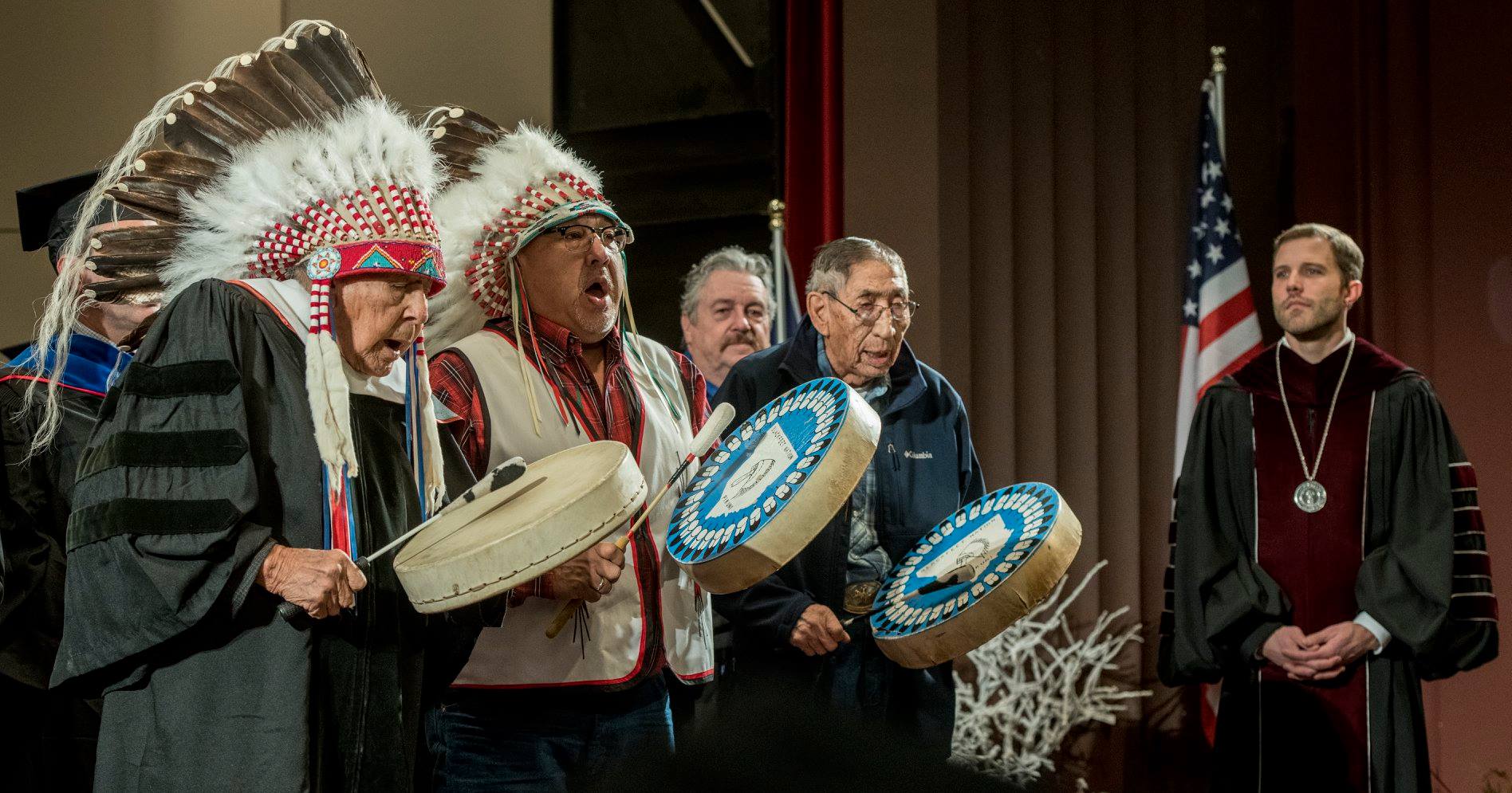‘We Still Sing’: Blackfeet Rawhide Singers Carry On Commencement Tradition
MISSOULA ꟷ For about the past 26 years, Chief Earl Old Person and the Rawhide Singers of the Blackfeet Nation have been making the four-hour trip down from Browning to the University of Montana campus every spring.
The 200-mile drive from the Blackfeet Indian Reservation to Missoula, just as western Montana finally awakes from winter slumber, is an annual journey for the Blackfeet elders. They arrive at UM’s graduation ceremonies with buffalo skin drums and eagle feather headdress and sing sacred tribal songs that are far older than any of us.
At 92 years old, Old Person is one of the country’s most decorated and respected Native leaders. He holds a UM honorary doctorate and is a lifetime honorary chief of the Blackfeet Nation. He knows his history.
And when he shares why it’s important for UM students, families and administration to hear those tribal songs on graduation day, we listen.
“We don’t sing only for our Native students, we do it for all of the graduates,” Old Person said. “It really means something for our young people to hear the songs. It means they have achieved something.”
The Rawhide Singers used to be four. Now they are two.
Kenneth Old Person died in August at age 83 and Victor Sure Chief died from cancer in 2010. Old Person and Paul Old Chief remain, though Old Person has folded in Joshua Horn, Kenneth’s great-grandson, as a next-generation Rawhide Singer.
“My dad loved singing, I grew up with him singing everywhere,” said Debbie Homegun, daughter of Kenneth. “He loved singing at the University, especially special tribal songs. It was one of his favorite things to do.”

Time is running short for elders who speak fluent Blackfeet and intimately know the songs, which can only really be learned by listening, Old Person said.
“The best teacher is hearing,” he said. “One day all of the elders will be gone. I tell my people, I tell our young people that the best time to learn is when they are young. Knowing our language, our songs is way to carry us forward.”
In the early ’90s, former UM President George Dennison asked Old Person if the Rawhide Singers might sing at Commencement. The president, who was given an Indian name from Old Person and enjoyed a long friendship with him, wanted to find a special way to honor UM’s Native graduates, many of them of the Blackfeet Nation, but represent all of Montana’s Indigenous peoples. Dennison also thought it was particularly important for UM non-Native students and their families to hear the songs.
“We did an opening song and then an opening prayer and this is how this all got started,” Old Person said. “I guess they liked our songs.”
For the next two decades, the Rawhide Singers would become ꟷ and still remain ꟷ a staple of UM’s annual Commencement ceremonies.
For a university that sits on the historical grounds of the Salish and Kalispel people, there’s a special Montanan reverence when the ancestral songs are laid on top of the drum beat rhythm, at the same moment when thousands of people in attendance suddenly go pin-dropping quiet.
UM’s Washington-Grizzly Stadium, where Commencement will be held this year, sits at the mouth of Hellgate Canyon. UM graduates sit in the same place where the Blackfeet maintained a skirmish line for defense of their hunting grounds and home country, hence the name “Hell’s Gate.”
Their words have been here longer than any notion of conferring academic degrees.
“These are society songs,” Old Person said. “Our people had societies within the reservation that resembled clans and each area would organize a society and compose a song,” he said. “We have a lot of honor songs. We’ve lost our societies, but we still have the songs. And we still sing.”
One song is particularly special, the Flag Song, that Old Person said is comparable to the Blackfeet national anthem, reserved only for moments of celebration.
“We sing the Flag song when our boys and girls become ladies and men, or when they join the armed forces,” he said. “We honor our veterans with this song and use this song for celebration to open graduation. It’s one of the main songs we sing.”
Because melodies carry memories, Old Person said the songs are a way to link the past of Indian culture to the futures of UM students.
“Our language, our songs, our traditions are the foundation of being Natives and it’s important for everyone to hear them,” he said. “We have to keep it going as long as we can.”
UM President Seth Bodnar said hosting the Rawhide Singers for Commencement continues to be an important tradition for the University.
“We understand what a significant honor it is to have the Rawhide Singers with us, not only to mark a distinct moment for our graduates, but also to reflect the important ways our community has been and continues to be shaped by our Indigenous colleagues and friends.”
Old Person said he wants to continue singing as long as he can, though he knows that won’t be forever.
“It’s an honor for us to be able to help out in this way,” he said. “Missoula is a special place for me.”
With the Rawhide Singers here, it is a special place for all of us.
###
Jenny Lavey, UM News Service
Contact: Dave Kuntz, UM strategic communications director, 406-243-5659, dave.kuntz@umontana.edu.